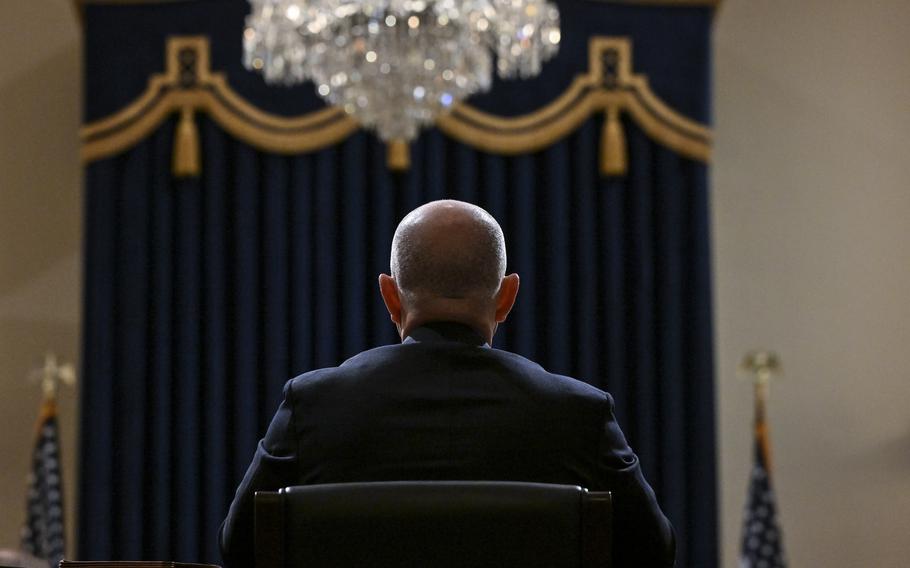U.S.
Mayorkas impeachment moving to Senate, where trial could end fast
The Washington Post April 16, 2024

Homeland Security Secretary Alejandro Mayorkas testifies during a House Committee on Homeland Security hearing on April 16, 2024. (Ricky Carioti/The Washington Post)
House Republicans delivered articles of impeachment against Homeland Security Secretary Alejandro Mayorkas to the Senate on Tuesday afternoon, commencing what is likely to be a brief trial in the upper chamber that could conclude as soon as Wednesday.
Led by 11 impeachment managers appointed by Speaker Mike Johnson (R-La.), House Republicans have demanded a full trial, while Senate Democrats, who hold a 51-49 majority, are planning to band together to dismiss or table the trial. Most Senate Republicans, despite previously voicing concerns about the substance of the two articles of impeachment against Mayorkas, have echoed the lower chamber’s calls for the Senate to adhere to precedent and hold a trial.
At least one Republican — Sen. Mitt Romney (Utah) — said last week that he planned to vote against a full trial. On Tuesday, Romney softened his position, telling reporters that he at least wanted debate on the articles before moving to dismiss them and therefore did not support tabling the charges. Several others who have been critical of the impeachment have yet to stake out their position, including GOP Sens. Susan Collins (Maine) and Lisa Murkowski (Alaska). Collins, citing her role as a juror in the trial, declined to weigh in on how she will vote, and Murkowski vaguely said she wanted “process.”
After House Republicans made the ceremonial walk across the Capitol to present the articles charging Mayorkas with “willful and systemic refusal to comply with the law” and “breach of public trust,” Rep. Mark Green (R-Tenn.), chairman of the Committee on Homeland Security, read them aloud on the Senate floor. Senators will be sworn in as jurors Wednesday, and then it will be incumbent on Senate Majority Leader Charles E. Schumer (D-N.Y.) to decide how to proceed.
Schumer decried the proceedings Monday, saying impeachment “should never be used to settle a policy disagreement” and vowing to “address the issue as expeditiously as possible.” It’s unclear whether Schumer will move to table or dismiss the case, a maneuver that requires 51 votes to pass.
Johnson responded Tuesday to Schumer’s remarks, calling him the “only impediment to delivering accountability for the American people.”
“Pursuant to the Constitution, the House demands a trial,” Johnson added.
Senate Republicans have been divided on how to best influence the process from their relatively powerless position in the minority; some have agitated for an opportunity to hold Democrats accountable for the record-breaking levels of migration at the southern U.S. border. Sen. John Thune (R-S.D.) said the Senate GOP conference had yet to come to an agreement on an approach to process the articles, but one of the options under consideration is a potential agreement with Democrats to ensure Republicans time to debate.
“I think right now there’s still a question about how it’ll get handled, and that’s something that our members are going to have to have a conversation about today, and then hopefully we’ll have a better insight into what that process might look like,” Thune said.
“There are different ways this can be approached, and that’s all kind of being bedded right now, and … we’ll see what people can agree to,” he added later in the afternoon.
A debate could be detrimental to some vulnerable Democrats, who have so far left the door open to supporting a trial pending further review of the articles of impeachment. Some Democrats have conversely argued that holding an extended trial could remind voters that Republicans blocked a border compromise bill they had previously demanded from Democrats, after it was panned by former president and presumptive GOP presidential nominee Donald Trump.
Republicans have made clear that they want to inflict maximum political pressure on their colleagues. Sen. Cynthia Lummis (R-Wyo.) said she was interested in capitalizing on procedural pathways “to make this as painful as possible if the Democrats are going to either move to dismiss or move to table.”
“This is a constitutional process that they are trying to shove under the rug, and I find that completely concerning,” Lummis added.
If no deal is reached, Republican senators can raise points of order Wednesday, but eventually Sen. Patty Murray (D-Wash.), the trial’s presiding officer, could rule them dilatory, and then the chamber would proceed to two votes to dismiss or table the two articles.
Sen. Thom Tillis (R-N.C.) predicted that Republicans would be united by the end of the day on voting against tabling or dismissing the trial.
Mayorkas, meanwhile, has been making the rounds on Capitol Hill over the past week, advocating for a DHS budget with higher funding than in the deal agreed to last month by the White House and Congress.
This is Mayorkas’s 30th time testifying before Congress in his capacity as DHS secretary, although he did not testify in his defense before the House Committee on Homeland Security after it revoked an invitation for him to appear, instead requesting written testimony.
“Secretary Mayorkas spent months helping a bipartisan group of Senators craft a tough but fair bill that would give DHS the tools necessary to meet today’s border security challenges, but the same House Republicans playing political games with this impeachment chose to block that bipartisan compromise,” a DHS spokesperson said in a statement. “Congressional Republicans should stop wasting time with unfounded attacks, and instead do their job by passing bipartisan legislation to properly fund the Department’s vital national security missions and finally fix our broken immigration system.”